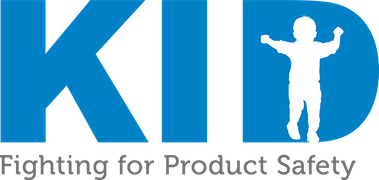New KID Report and Consumer Survey Reveal Need for Improvements in Children’s Product Recall Process
FOR IMMEDIATE RELEASE
September 12, 2024
Contact: Dev Gowda, KID; dev@kidsindanger.org
[Chicago, IL] – Kids In Danger (KID), a nonprofit organization dedicated to protecting children by fighting for product safety, released two new reports looking to better assess recall effectiveness. The first report, Recall Reality: Are They Failing our Children?, examines trends regarding the effectiveness of children’s product recalls issued by the Consumer Product Safety Commission (CPSC). Following a product recall, all recalling companies are required to agree to a Corrective Action Plan (CAP). This includes any remedial actions taken to mitigate the potential hazard, including outreach, remedy, and destruction of recalled products. KID’s new report looked at monthly progress reports required by the CPSC to track the recall process and progress of these CAPs.
The key findings include:
- Compared to prior years, KID noticed an increase in sufficient reports for analysis. There were 36% sufficient reports in 2022, almost four times the amount of sufficient reports KID received the first year CAP report data was looked at (2016). This is still just over a third of recalls required to submit information.
- Companies using Section 6(b) of the Consumer Product Safety Act to block release of their recall reports to the public have something to hide: they had the highest average per recall of incidents reported prior to the recall and also had the highest average number of recalled units per product.
- On average, only 22% of recalled children’s products that were with the consumer were successfully recalled.
In a companion report, KID also reviewed survey data on consumer attitudes towards recalls and their response to recall notices. The survey responses, gathered from parents and caregivers, reveal critical gaps in the current children’s product recall process.
The key findings from KID’s survey include:
- Safety is the most prominent motivation to participate in recalls and time and effort are the main reasons for not participating in a recall.
- When the recall remedy offered for a recalled product was only a repair, rather than a full refund or new product, customers reported a lower experience for the recall overall and were less likely to tell others about the recall.
“Parents and caregivers need a more robust recall process that prioritizes the safety of children above all else,” said Dev Gowda, Deputy Director of KID. “Our reports highlight the need for changes to how recalls are communicated and managed as well as more data to evaluate recall effectiveness. Implementing these recommendations will prevent dangerous products from remaining in homes and childcare facilities, ultimately protecting children from harm.”
“The newest report and survey results from Kids In Danger (KID) emphasize that more must be done to ensure the safety of children’s products. Consumers deserve to know that the products they purchase for themselves and for their kids are safe,” said Congresswoman Jan Schakowsky, Ranking Member of the House Committee on Energy and Commerce Subcommittee on Innovation, Data, and Commerce (IDC), which has authority over consumer protection matters. “According to KID’s latest data, companies are hiding behind Section 6(b) of the Consumer Product Safety Actwhich prevents the Consumer Product Safety Commission (CPSC) from telling the public about potentially dangerous products without a company’s permission. This little-known provision is leading to higher incident rates and endangering countless children.Companies should not be able to block the release of their recall reports.That is why we must pass my bills, the Sunshine in Product Safety Act and the Consumer Advocacy and Protection Act, to give the CPSC the power to repeal Section 6(b) and hold companies who market dangerous products accountable. Further, we need to robustly fund the CPSC, which is working hard to protect our kids. With how much money companies spend on advertising; they should have no problem devoting additional funding to alerting consumers when a hazardous product has been recalled. I will continue to work with my colleagues in Congress to pass pro-consumer legislation that keeps Americans, especially our children, safe.”
“The Sunshine in Product Safety Act would free the Consumer Product Safety Commission (CPSC) to swiftly warn the public about dangerous products, preventing needless tragedies and saving lives. Section 6(b) acts as a regulatory straightjacket preventing the CPSC from properly informing consumers about vital product safety information. Effective CPSC action can be a matter of life and death,” said Senator Richard Blumenthal (D-CT).
KID recommends key improvements to the children’s product recall process. Companies should offer more comprehensive remedies, such as refunds or replacement products rather than just repairs or discounts. Manufacturers and the CPSC also need to increase outreach and communication of recalls in as many ways as possible and consider incentives to participate. Policymakers should also pass the Sunshine in Product Safety Act to repeal Section 6(b) of the Consumer Product Safety Act to prevent companies from hiding or delaying information about their dangerous products. KID urges manufacturers, regulatory bodies, and other stakeholders to consider these findings and take action to improve the recall process.
Read the full recall effectiveness report, Recall Reality: Are They Failing our Children?, here.
Read KID’s survey results about consumer recall behavior here.
—
Kids In Danger (KID) is a nonprofit organization dedicated to protecting children by fighting for product safety. KID save lives by enhancing transparency and accountability through safer product development, better education and stronger advocacy for children.
